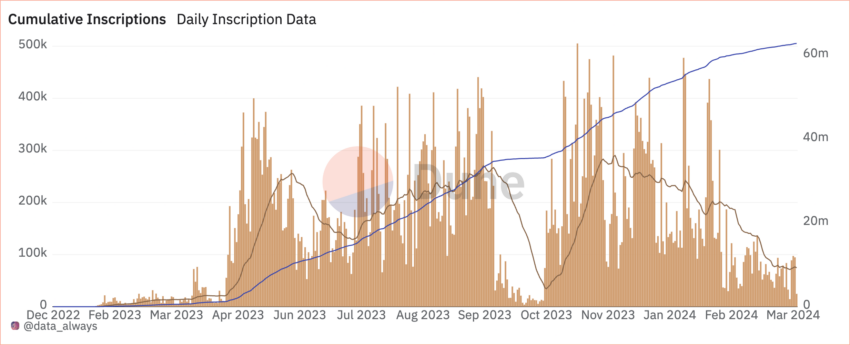Former Wu-Tang Clan member Ghostface Killah will drop exclusive music on Bitcoin Ordinals. The announcement comes amid a recent surge in Oridnals sales and the increasing popularity of music inscriptions.
The musician will mint 10,000 NFTs that holders can freely build upon without copyright restrictions.
Why Wu-Tang Is Just the Start of Bitcoin Ordinals Music
Killah, whose real name is Dennis David Coles, created his collection with the help of the Ordinals Bot and NFT artists Rare Scrilla and NakaPepes. Interestingly, he has not provided a minting date or base price for his collection.
Other project collaborators, Rare Scrilla and NakaPepes, have launched their own collections on Bitcoin Ordinals. Rare Scrilla floats the SOUNDS V.1 audio inscription collection on MagicEden and has links with the recently launched Book of Meme project on Solana. Meanwhile, NakaPepes created the Ordistorians collection, communicating blockchain history through Memetic NFTs.
Prior to Killah, African-born artist French Montana became the first mainstream artist to inscribe a song on Bitcoin. The track consumed 3.956 megabytes of Bitcoin transaction block space, the third-most of any Ordinals inscription.
Read more: Bitcoin NFTs: Everything You Need To Know About Ordinals

The Bitcoin Ordinals protocol enables digital files to be inscribed on a “satoshi” (one hundred millionths of a Bitcoin). The project was developed by Casey Rodamor in 2023 and has provided a novel use case for the Bitcoin network.
Ordinals differ from Ethereum-based NFTs because the protocol stores file data directly on the blockchain. Ethereum gives NFT holders a special ERC-721 token or certificate that records ownership of a remotely stored digital or physical asset.
Though music was a popular use case for Ethereum NFTs, similar projects on Ordinals are rare. This could be because 4 megabytes of storage space limits an inscription’s size. However, a recent community development could make Ordinals NFTs more versatile.
Recursive inscriptions can exchange data with each other, mimicking the composability of Ethereum’s smart contracts. Therefore, content creators can surpass the original 4 MB size cap, limiting regular inscriptions, as explained by ‘Ordifluencer’ LeonidasNFT.
“Inscriptions can now use a special “/-/content/:inscription_id” syntax to request the content of other inscriptions. This simple change unlocks many powerful use cases. For example, rather than inscribing 10,000 JPEG files for a PFP collection individually which would be quite expensive, you could inscribe the 200 traits from the collection and then make 10,000 more inscriptions that each use a small amount of code to request traits and programmatically render the image,” LeonidasNFT said.
A pseudonymous developer named Ratoshi recently deployed a sizeable music generation engine on Ordinals using recursive inscriptions. He created composable sound clips that users could combine via artificial intelligence to create a new track. The code for the engine was deployed on a single inscription, with updates added via smaller inscriptions.
Trusted
Disclaimer
In adherence to the Trust Project guidelines, BeInCrypto is committed to unbiased, transparent reporting. This news article aims to provide accurate, timely information. However, readers are advised to verify facts independently and consult with a professional before making any decisions based on this content. Please note that our Terms and Conditions, Privacy Policy, and Disclaimers have been updated.


